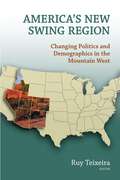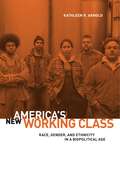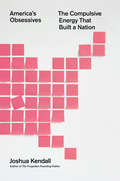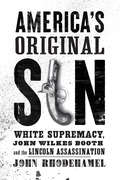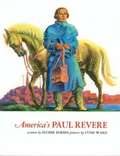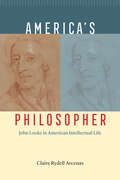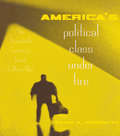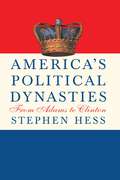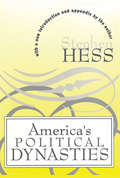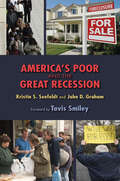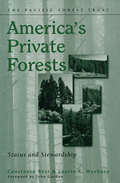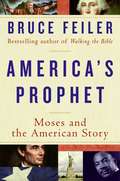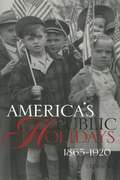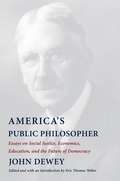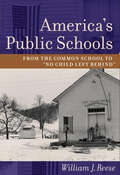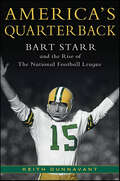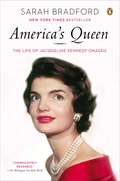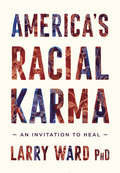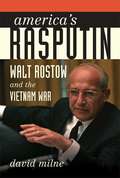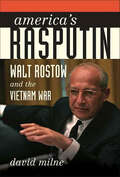- Table View
- List View
America's New Swing Region
by Ruy A. TeixeiraThe Mountain West--Arizona, Colorado, Idaho, Nevada, New Mexico, and Utah--has become the new swing region in American politics. All signs point to these states, especially Colorado, Nevada and New Mexico, being crucial in the 2012 election. Unfortunately, the rise of this region has been underreported in the media, and many political observers have only the most superficial understanding of the profound economic, political, and social changes that continue to reshape the Mountain West. America's New Swing Region is the remedy.Led by bestselling author and political analyst Ruy Teixeira, a talented group of scholars assembled by the Brookings Mountain West program (housed at the University of Nevada-Las Vegas) presents the facts and the narrative necessary for understanding what is happening in this region and why it is so important.Contents 1. Introduction and Overview2. America's New Swing Region: The Political Demography and Geography of the Mountain West3. Metropolitan Voting Patterns in the Mountain West: The New and Old Political Heartlands4. Hispanics, Race, and the Changing Political Landscape of the United States Mountain West5. The Political Attitudes of the Millennial Generation in the Mountain West6. The Mountain West Today: A Regional Survey7. Reapportionment and Redistricting in the Mountain WestContributors include Karlyn Bowman (American Enterprise Institute), David Damore(University of Nevada-Las Vegas (UNLV), William Frey (Brookings Institution), Scott Keeter (Pew Research Center), Robert E. Lang (Brookings, UNLV, and the Lincy Institute), Tom Sanchez (Virginia Tech University), and Ruy Teixeira (Century Foundation and the Center for American Progress).
America's New Swing Region
by Ruy A. TeixeiraThe Mountain West-Arizona, Colorado, Idaho, Nevada, New Mexico, and Utah-has become the new swing region in American politics. All signs point to these states, especially Colorado, Nevada and New Mexico, being crucial in the 2012 election. Unfortunately, the rise of this region has been underreported in the media, and many political observers have only the most superficial understanding of the profound economic, political, and social changes that continue to reshape the Mountain West. America's New Swing Region is the remedy.Led by bestselling author and political analyst Ruy Teixeira, a talented group of scholars assembled by the Brookings Mountain West program (housed at the University of Nevada-Las Vegas) presents the facts and the narrative necessary for understanding what is happening in this region and why it is so important.Contents 1. Introduction and Overview2. America's New Swing Region: The Political Demography and Geography of the Mountain West3. Metropolitan Voting Patterns in the Mountain West: The New and Old Political Heartlands4. Hispanics, Race, and the Changing Political Landscape of the United States Mountain West5. The Political Attitudes of the Millennial Generation in the Mountain West6. The Mountain West Today: A Regional Survey7. Reapportionment and Redistricting in the Mountain WestContributors include Karlyn Bowman (American Enterprise Institute), David Damore(University of Nevada-Las Vegas (UNLV), William Frey (Brookings Institution), Scott Keeter (Pew Research Center), Robert E. Lang (Brookings, UNLV, and the Lincy Institute), Tom Sanchez (Virginia Tech University), and Ruy Teixeira (Century Foundation and the Center for American Progress).
America's New Working Class: Race, Gender, and Ethnicity in a Biopolitical Age
by Kathleen R. ArnoldToday’s political controversy over immigration highlights the plight of the working class in this country as perhaps no other issue has recently done. The political status of immigrants exposes the power dynamics of the “new working class,” which includes the former labor aristocracy, women, and people of color. This new working class suffers exploitation in advanced industrial countries as the social cost of capitalism’s success in a neoliberal and globalized political economy. Paradoxically, as borders become more open, they are also increasingly fortified, subjecting many workers to the suspension of law.In this book, Kathleen Arnold analyzes the role of the state’s “prerogative power” in creating and sustaining this condition of severe inequality for the most marginalized sectors of our population in the United States. Drawing on a wide range of theoretical literature from Locke to Marx and Agamben (whose notion of “bare life” features prominently in her construal of this as a “biopolitical” era), she focuses attention especially on the values of asceticism derived from the Protestant work ethic to explain how they function as ideological justification for the exercise of prerogative power by the state.As a counter to this repressive set of values, she develops the notion of “authentic love” borrowed from Simone de Beauvoir as a possible approach for dealing with the complex issues of exploitation in liberal democracy today.
America's Obsessives: The Compulsive Energy That Built a Nation
by Joshua KendallWhen most of us think of Charles Lindbergh, we picture a dashing twenty-five-year-old aviator stepping out of the Spirit of St. Louis after completing his solo flight across the Atlantic. What we don't see is the awkward high school student, who preferred ogling new gadgets at the hardware store to watching girls walk by in their summer dresses. Sure, Lindbergh's unique mindset invented the pre-flight checklist, but his obsession with order also led him to demand that his wife and three German mistresses account for all their household expenditures in detailed ledgers.Lucky Lindy is just one of several American icons whom Joshua Kendall puts on the psychologist's couch in AMERICA'S OBSESSIVES. In this fascinating look at the arc of American history through the lens of compulsive behavior, he shows how some of our nation's greatest achievements-from the Declaration of Independence to the invention of the iPhone-have roots in the disappointments and frustrations of early childhood.Starting with the obsessive natures of some of Silicon Valley's titans, including Steve Jobs, Kendall moves on to profile seven iconic figures, such as founding father Thomas Jefferson, licentious librarian Melvil Dewey, condiment kingpin H. J. Heinz, slugger Ted Williams, and Estee Lauder. This last personality was so obsessed with touching other women's faces that she transformed her compulsion into a multibillion-dollar cosmetics corporation.Entertaining and instructive, Kendall offers up a few scoops along the way: Little do most Americans know that Charles Lindbergh, under the alias Clark Kent, sired seven children with his three German "wives." As Lindbergh's daughter Reeve told Kendall, "Now I know why he was gone so much. I also understand why he was delighted when I was learning German."
America's Original Sin: White Supremacy, John Wilkes Booth, and the Lincoln Assassination
by John RhodehamelFinally, a compelling narrative history of the Lincoln assassination that refuses to ignore John Wilkes Booth's motivation: his growing, obsessive commitment to white supremacy.On April 14, 1865, after nearly a year of conspiring, John Wilkes Booth shot Abraham Lincoln as the president watched a production of Our American Cousin at Ford's Theatre. Lincoln died the next morning. Twelve days later, Booth himself was fatally shot by a Union soldier after an extensive manhunt. The basic outline of this story is well known even to schoolchildren; what has been obscured is Booth's motivation for the act, which remains widely misunderstood nearly 160 years after the shot from his pocket pistol echoed through the crowded theater. In this riveting new book, John Rhodehamel argues that Booth's primary motivation for his heinous crime was a growing commitment to white supremacy. In alternating chapters, America's Original Sin shows how, as Lincoln's commitment to emancipation and racial equality grew, so too did Booth's rage and hatred for Lincoln, whom he referred to as "King Abraham Africanus the First." Examining Booth's early life in Maryland, Rhodehamel traces the evolution of his racial hatred from his youthful embrace of white supremacy through to his final act of murder. Along the way, he considers and discards other potential motivations for Booth's act, such as mental illness or persistent drunkenness, which are all, Rhodehamel writes, either insufficient to explain Booth's actions or were excuses made after the fact by those who sympathized with him.Focusing on how white supremacy brought about the Civil War and, later, betrayed the conflict's emancipationist legacy, Rhodehamel's masterful narrative makes this old story seem new again. The first book to explicitly name white supremacy as the motivation for Lincoln's assassination, America's Original Sin is an important and eloquent look at one of the most notorious episodes in American history.
America's Past and Promise
by Lorna C. MasonAmerica's Past and Promise deals primarily with the nation's past. It represents the future promise of America and thus makes the students know of America's past and will help them fulfill the America's promise.
America's Past and Promise: Beginnings through Reconstruction
by Jesus Garcia C. Frederick Risinger Lorna Mason Frances PowellThis book is about people--the people of our nation's past. You'll hear them speak, see how they lived, and follow them through history as they build the United States. Why is this book fun to use? Read it and see!
America's Pastor
by Grant WackerMore than a conventional biography, Grant Wacker's interpretive study deepens our understanding of why Billy Graham has mattered so much to so many, and how his uncanny ability to appropriate trends in the wider culture allowed him to transform his born-again theology into a moral vocabulary capturing the aspirations and fears of average Americans.
America's Paul Revere
by Esther Hoskins ForbesA vivid history of one of America's best-loved patriots.
America's Philosopher: John Locke in American Intellectual Life
by Claire Rydell ArcenasAmerica’s Philosopher examines how John Locke has been interpreted, reinterpreted, and misinterpreted over three centuries of American history. The influence of polymath philosopher John Locke (1632–1704) can still be found in a dizzying range of fields, as his writings touch on issues of identity, republicanism, and the nature of knowledge itself. Claire Rydell Arcenas’s new book tells the story of Americans’ longstanding yet ever-mutable obsession with this English thinker’s ideas, a saga whose most recent manifestations have found the so-called Father of Liberalism held up as a right-wing icon. The first book to detail Locke’s trans-Atlantic influence from the eighteenth century until today, America’s Philosopher shows how and why interpretations of his ideas have captivated Americans in ways few other philosophers—from any nation—ever have. As Arcenas makes clear, each generation has essentially remade Locke in its own image, taking inspiration and transmuting his ideas to suit the needs of the particular historical moment. Drawing from a host of vernacular sources to illuminate Locke’s often contradictory impact on American daily and intellectual life from before the Revolutionary War to the present, Arcenas delivers a pathbreaking work in the history of ideas.
America's Political Class Under Fire: The Twentieth Century's Great Culture War
by David A. HorowitzFirst Published in 2003. Routledge is an imprint of Taylor & Francis, an informa company.
America's Political Dynasties
by Stephen HessThe Constitution states that "no title of nobility shall be granted by the United States," yet it seems political nobility is as American as apple pie.As Hess illustrates, while there always have been dynasties in America, they have not always been the same families: Dynasties are born and dynasties die, their rise and fall is part of the flux of a constantly changing political scene.America was founded in rebellion against nobility and inherited status. Yet from the start, dynastic families have been conspicuous in national politics. The Adamses. The Lodges. The Tafts. The Roosevelts. The Kennedys. And today the Bushes and the Clintons.Longtime presidential historian Stephen Hess offers an encyclopedic tour of the families that have loomed large over America's political history.Starting with John Adams, who served as the young nation's first vice president and earned the nickname "His Rotundity," Hess paints the portraits of the men and women who, by coincidence, connivance, or sheer sense of duty, have made up America's political elite. There are the well-known dynasties such as the Roosevelts and the Kennedys, and the names that live on only in history books, such as the Bayards (six generations of U.S. senators) and the Breckinridges (a vice president, two senators, and six representatives).Hess fills the pages of America's Political Dynasties with anecdotes and personality-filled stories of the families who have given the United States more than a fair share of its presidents, senators, governors, ambassadors, and cabinet members.This book also tells us the stories of the Bushes and what looks to be a political dynasty in waiting, the Clintons. Emblematic of America's growing diversity, Hess also examines how women, along with ethnic and racial minorities, have joined the ranks of dynastic political families.
America's Political Dynasties: From Adams To Clinton
by Stephen HessThis is the 30th anniversary edition of a book that was hailed on publication in 1966 as "fascinating" by Margaret L. Coit in the Saturday Review and as "masterly" by Henry F. Graff in the New York Times Book Review.The Constitution could not be more specific: "No title of nobility shall be granted by the United States." Yet, in over two centuries since these words were written, the American people, despite official disapproval, have chosen a political nobility. For generation after generation they have turned for leadership to certain families. They are America's political dynasties. Now, in the twentieth century, surprisingly, American political life seems to be largely peopled by those who qualify, in Stewart Alsop's phrase, as "People's Dukes." They are all around us Kennedys, Longs, Tafts, Roosevelts.Here is the panorama of America's political dynasties from colonial days to the present in fascinating profiles of sixteen of the leading families. Some, like the Roosevelts, have shown remarkable staying power. Others are all but forgotten, such as the Washburns, a family in which four sons of a bankrupt shopkeeper were elected to Congress from four different states. America's Political Dynasties investigates the roles of these families in shaping the nation and traces the whole pattern of political inheritance, which has been a little considered but unique and significant feature of American government and diplomacy. And in doing so, it also illuminates the lives and personalities of some two hundred often engaging, usually ambitious, sometimes brilliant, occasionally unscrupulous individuals.
America's Poor and the Great Recession
by John D. Graham Kristin S. Seefeldt&“A thorough and enlightening survey of the impact and legacy of the Great Recession on low-income Americans . . . accessible and readable.&” —Journal of American Studies Millions entered poverty as a result of the Great Recession&’s terrible toll of long-term unemployment. In this book, Kristin S. Seefeldt and John D. Graham examine recent trends in poverty and assess the performance of America&’s safety-net programs. They consider likely scenarios for future developments and conclude that the well-being of low-income Americans, particularly the working poor, the near poor, and the new poor, is at substantial risk despite economic recovery. &“[This] primer on the state of America&’s poor in the wake of the Great Recession of 2007 to 2009 cuts through Beltway theater and provides a clear picture of the magnitude of poverty of the United States as well as the patchwork nature of social services targeting the poor.&” —Journal of Policy Analysis and Management
America's Private Forests: Status And Stewardship
by John Gordon Laurie A. Wayburn Constance Best Pacific Forest TrustNearly 430 million acres of forests in the United States are privately owned, but the viability, and indeed the very existence, of these forests is increasingly threatened by population growth, sprawling urbanization, and patchwork development. Scientists, policymakers, and community leaders have begun to recognize the vital role of private forests in providing society with essential goods and services, from sustainable timber supplies to clean water. Yet despite the tremendous economic and ecological importance of private forests, information about their status and strategies for their protection have been in short supply.America's Private Forests addresses that shortcoming, presenting extensive data gathered from diverse sources and offering a concise overview of the current status of privately owned forests in the United States. As well as describing the state of private forests, the book sets forth detailed information on a wide range of approaches to conservation along with an action agenda for implementing those strategies likely to be most effective.Based on extensive research of existing literature as well as interviews and consultation with leading forestry and conservation experts, America's Private Forests is a unique sourcebook that offers a solid basis for discussion of threats to private forests along with an invaluable compendium of potential solutions. It will serve as an invaluable reference for those working to conserve and steward forest resources, including forest owners and their consultants, conservation organizations, and agency personnel, as well as researchers and students involved with issues of forestry, biodiversity, land use, and conservation.
America's Prophet
by Bruce FeilerThe exodus story is America's story. Moses is our real founding father. The pilgrims quoted his story. Franklin and Jefferson proposed he appear on the U.S. seal. Washington and Lincoln were called his incarnations. The Statue of Liberty and Superman were molded in his image. Martin Luther King, Jr., invoked him the night before he died. Ronald Reagan and Barack Obama cited him as inspiration. For four hundred years, one figure inspired more Americans than any other. His name is Moses. In this groundbreaking book, New York Times bestselling author Bruce Feiler travels through touchstones in American history and traces the biblical prophet's influence from the Mayflower through today. He visits the island where the pilgrims spent their first Sabbath, climbs the bell tower where the Liberty Bell was inscribed with a quote from Moses, retraces the Underground Railroad where "Go Down, Moses" was the national anthem of slaves, and dons the robe Charlton Heston wore in The Ten Commandments. "Even a cursory review of American history indicates that Moses has emboldened leaders of all stripes," Feiler writes, "patriot and loyalist, slave and master, Jew and Christian. Could the persistence of his story serve as a reminder of our shared national values? Could he serve as a unifying force in a disunifying time? If Moses could split the Red Sea, could he unsplit America?" One part adventure story, one part literary detective story, one part exploration of faith in contemporary life, America's Prophet takes readers through the landmarks of America's narrative--from Gettysburg to Selma, the Silver Screen to the Oval Office--to understand how Moses has shaped the nation's character. Meticulously researched and highly readable, America's Prophet is a thrilling, original work of history that will forever change how we view America, our faith, and our future.
America's Public Holidays
by Ellen M. LitwickiFrom the revered Memorial Day to the forgotten Lasties Day, America's Public Holidays is a timely and thoughtful analysis of how the civic culture of America has been fashioned. By analyzing how holidays became a forum for expressing patriotism, how public tradition has been invented, and how the definition of America itself was changed, Ellen Litwicki tells the intriguing story of the elite effort to create new holidays and the variety of responses from ordinary Americans.
America's Public Philosopher: Essays on Social Justice, Economics, Education, and the Future of Democracy
by John DeweyJohn Dewey was America’s greatest public philosopher. A prolific and influential writer for both scholarly and general audiences, he stands out for the remarkable breadth of his contributions. Dewey was a founder of a distinctly American philosophical tradition, pragmatism, and he spoke out widely on the most important questions of his day. He was a progressive thinker whose deep commitment to democracy led him to courageous stances on issues such as war, civil liberties, and racial, class, and gender inequalities.This book gathers the clearest and most powerful of Dewey’s public writings and shows how they continue to speak to the challenges we face today. An introductory essay and short introductions to each of the texts discuss the current relevance and significance of Dewey’s work and legacy. The book includes forty-six essays on topics such as democracy in the United States, political power, education, economic justice, science and society, and philosophy and culture. These essays inspire optimism for the possibility of a more humane public and political culture, in which citizens share in the pursuit of lifelong education through participation in democratic life. America’s Public Philosopher reveals John Dewey as a powerful example for scholars seeking to address a wider audience and a much-needed voice for all readers in search of intellectual and moral leadership.
America's Public Schools: From the Common School to "No Child Left Behind" (The American Moment)
by William J. ReeseIn this update to his landmark publication, William J. Reese offers a comprehensive examination of the trends, theories, and practices that have shaped America’s public schools over the last two centuries. Reese approaches this subject along two main lines of inquiry—education as a means for reforming society and ongoing reform within the schools themselves. He explores the roots of contemporary educational policies and places modern battles over curriculum, pedagogy, race relations, and academic standards in historical perspective.A thoroughly revised epilogue outlines the significant challenges to public school education within the last five years. Reese analyzes the shortcomings of "No Child Left Behind" and the continued disjuncture between actual school performance and the expectations of government officials. He discusses the intrusive role of corporations, economic models for enticing better teacher performance, the continued impact of conservatism, and the growth of home schooling and charter schools. Informed by a breadth of historical scholarship and based squarely on primary sources, this volume remains the standard text for future teachers and scholars of education.
America's Quarterback: Bart Starr and the Rise of The National Football League
by Keith DunnavantThe definitive, authorized biography of Bart Starr, quarterback for the University of Alabama and for the Green Bay Packers during the 1960s. A must-read for fans of the Crimson Tide, the Packers, and football greats.No one can touch Bart Starr's record setting 5 NFL Championships including 3 straight. America's Quarterback tells the story of the man who helped create the legend of Vince Lombardi and the Green Bay Packers. Set against the changing landscape of the last half of the 20th century, this biography traces Starr's life from childhood in Alabama to stardom in Green Bay and beyond. Not a simple sports story, Keith Dunnavant traces the story of one man reaching for the American dream while professional football emerged from the shadows to capture the nation's imagination. It's a story of the tension between a coach and a player as different as fire and ice, and how they came to trust and revere each other. It's a story of triumph tempered by tragedy, and the world-class athlete who quietly, persistently, achieved a level of greatness unsurpassed by any quarterback since.A remarkable blend of personal memory and historical narrative, America's Quarterback is a tribute to an American hero and the perfect companion to the classic When Pride Still Mattered.
America's Queen: The Life of Jacqueline Kennedy Onassis
by Sarah BradfordAcclaimed biographer Sarah Bradford explores the life of Jacqueline Kennedy Onassis, the woman who has captivated the public for more than five decades, in a definitive portrait that is both sympathetic and frank. With an extraordinary range of candid interviews--many with people who have never spoken in such depth on record before--Bradford offers new insights into the woman behind the public persona. She creates a coherent picture out of Jackie's tumultuous and cosmopolitan life--from the aristocratic milieu of Newport and East Hampton to the Greek isles, from political Washington to New York's publishing community. She probes Jackie's privileged upbringing, her highly public marriages, and her roles as mother and respected editor, and includes rare photos from private collections to create the most complete account yet written of this legendary life.
America's Queen: The Life of Jacqueline Kennedy Onassis
by Sarah BradfordAcclaimed biographer Sarah Bradford explores the life of Jacqueline Kennedy Onassis, the woman who has captivated the public for more than five decades, in a definitive portrait that is both sympathetic and frank. With an extraordinary range of candid interviews--many with people who have never spoken in such depth on record before--Bradford offers new insights into the woman behind the public persona. She creates a coherent picture out of Jackie's tumultuous and cosmopolitan life--from the aristocratic milieu of Newport and East Hampton to the Greek isles, from political Washington to New York's publishing community. She probes Jackie's privileged upbringing, her highly public marriages, and her roles as mother and respected editor, and includes rare photos from private collections to create the most complete account yet written of this legendary life.
America's Racial Karma: An Invitation to Heal
by Larry WardImmediate, illuminating, and hopeful: this is the key set of talks given by leading Zen Buddhist teacher Larry Ward, PhD, on breaking America's cycle of racial trauma."I am a drop in the ocean, but I'm also the ocean. I'm a drop in America, but I'm also America. Every pain, every confusion, every good and every bad and ugly of America is in me. And as I transform myself and heal and take care of myself, I'm very conscious that I'm healing and transforming and taking care of America. I say this for American cynics, but this is also true globally. It's for real." So says Zen Buddhist teacher Dr. Larry Ward.Shot at by the police as an 11-year-old child for playing baseball in the wrong spot, as an adult, Larry Ward experienced the trauma of having his home firebombed by racists. At Plum Village Monastery in France, the home in exile of his teacher, Vietnamese peace activist and Zen teacher Thich Nhat Hanh, Dr. Ward found a way to heal. In these short reflective essays, he offers his insights on the effects of racial constructs and answers the question: how do we free ourselves from our repeated cycles of anger, denial, bitterness, pain, fear, violence? Larry Ward looks at the causes and conditions that have led us to our current state and finds, hidden in the crisis, a profound opportunity to reinvent what it means to be a human being. This is an invitation to transform America's racial karma.
America's Rasputin: Walt Rostow and the Vietnam War
by David MilneWalt Rostow's meteoric rise to power -- from Flatbush, Brooklyn, to the West Wing of the White House -- seemed to capture the promise of the American dream. Hailing from humble origins, Rostow became an intellectual powerhouse: a professor of economic history at MIT and an influential foreign policy adviser to John F. Kennedy and Lyndon B. Johnson. Too influential, according to some. While Rostow inspired respect and affection, he also made some powerful enemies. Averell Harriman, one of America's most celebrated diplomats, described Rostow as "America's Rasputin" for the unsavory influence he exerted on presidential decision-making. Rostow was the first to advise Kennedy to send U.S. combat troops to South Vietnam and the first to recommend the bombing of North Vietnam. He framed a policy of military escalation, championed recklessly optimistic reporting, and then advised LBJ against pursuing a compromise peace with North Vietnam. David Milne examines one man's impact on the United States' worst-ever military defeat. It is a portrait of good intentions and fatal misjudgments. A true ideologue, Rostow believed that it is beholden upon the United States to democratize other nations and do "good," no matter what the cost. America's Rasputin explores the consequences of this idealistic but unyielding dogma.
America's Rasputin: Walt Rostow and the Vietnam War
by David MilneDavid Milne's America's Rasputin provides the first major study of the man who pushed two presidents into Vietnam.Walt Rostow's meteoric rise to power—from Flatbush, Brooklyn, to the West Wing of the White House—seemed to capture the promise of the American dream. Hailing from humble origins, Rostow became an intellectual powerhouse: a professor of economic history at MIT and an influential foreign policy adviser to John F. Kennedy and Lyndon B. Johnson. Too influential, according to some. While Rostow inspired respect and affection, he also made some powerful enemies. Averell Harriman, one of America's most celebrated diplomats, described Rostow as "America's Rasputin" for the unsavory influence he exerted on presidential decision-making. Rostow was the first to advise Kennedy to send U.S. combat troops to South Vietnam and the first to recommend the bombing of North Vietnam. He framed a policy of military escalation, championed recklessly optimistic reporting, and then advised LBJ against pursuing a compromise peace with North Vietnam. David Milne examines one man's impact on the United States' worst-ever military defeat. It is a portrait of good intentions and fatal misjudgments. A true ideologue, Rostow believed that it is beholden upon the United States to democratize other nations and do "good," no matter what the cost. America's Rasputin explores the consequences of this idealistic but unyielding dogma.
